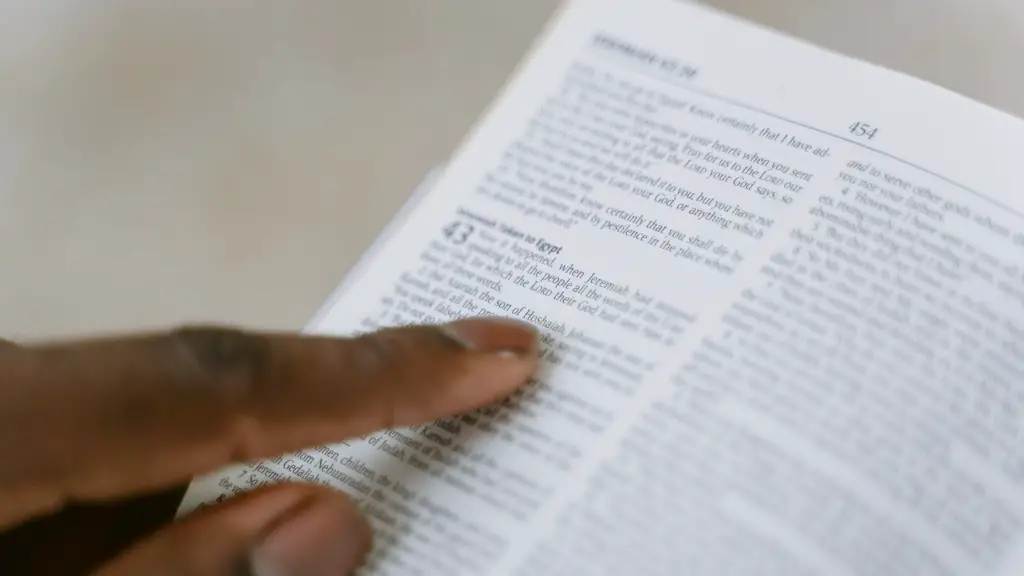It is no secret that the Bible does not approve of bad words. In fact, it is a source of authority when it comes to morality, and it commands us to stay away from using words that might be considered offensive. The Bible alone has a lot to say about how language can be used among people, and it goes to great lengths to illustrate how bad language can be damaging. So, what exactly does the Bible say about bad words?
The Bible is clear that the use of bad language should be avoided. In Matthew 5:7–9, Jesus states that people should ‘bless and not curse’. Similarly, in Ephesians 4:29, Paul instructs us to ‘not let any unwholesome talk come out of your mouths’. In both cases, it is evident that the use of profanity and other bad words should be avoided. Specifically, it is not just the words themselves that are discouraged, but the intentional use of such language. Through these verses, the Bible is highlighting the importance of avoiding bad words so as not to speak in a way that is unhelpful, hurtful or offensive to others.
Apart from outright prohibiting the use of bad language, the Bible also explains that bad words should not be used in any context or situation. In Proverbs 4:24, the writer states: ‘Put away perversity from your mouth; keep corrupt talk far from your lips’. This verse is particularly interesting because it is not just speaking out against the use of bad language, but is also emphasizing the importance of keeping our words in check. Furthermore, James 3:10 tells us that ‘from the same mouth come blessing and cursing’, which implies that the use of bad language has all the more serious consequences, since it disrupts our relationships and can cause divides among people.
In addition to what is said in the Bible regarding bad words, experts have suggested some insightful perspectives when it comes to the use of language. For example, linguistics professor John McWhorter has argued that people should not be ashamed about using certain words, as it can be considered a form of self-expression and personal autonomy. Other experts have suggested that the use of bad words can be seen as a sign of creativity, since it allows for a greater range of expression. Ultimately, the key point is that language can be a powerful tool, and it is important to use it wisely.
From all this it is easy to see why the Bible has a lot to say about bad words. Apart from the explicit prohibitions mentioned in Scripture, it is evident that the intentional use of bad language can be damaging to relationships and can be degrading or offensive. While our language and its use can be interpreted in different ways, it is essential that we take pause to consider the implications of our words before speaking. Ultimately, it is up to us to be mindful of the words we use, and to think deeply about the impacts that our words can have on both ourselves and others.
Different Perspectives On The Issue
As mentioned earlier, talking about bad language can evoke a variety of opinions and perspectives. Some people believe that the use of bad language is inappropriate and should be avoided, whereas others consider it to be a form of self-expression. While these different perspectives may be seen as valid, it is important to consider the implications of our words, and to take into account the Bible’s guidance when thinking about how to use language wisely.
On one hand, some people consider the use of bad language to be an act of rebellion against societal norms. This can be seen in some instances, such as when students use bad language in protest to the school system. Alternatively, some may see the use of bad language as a form of self-expression. This could include those who feel the need to ‘vent’ through the use of certain words, or individuals who are trying to express certain emotions. Both of these perspectives demonstrate an understanding of the power of language, and its ability to convey thoughts and feelings more effectively than any other means.
However, it should also not be overlooked that there are dangers associated with bad language. In certain situations, it can be seen as aggressive and potentially insulting. This could include situations where one is using bad language out of anger or frustration. In addition, it is important to remember that the use of bad language can signify a lack of respect towards others, which is something to be avoided. Moreover, bad language can also be seen as something that is not fitting in certain contexts, such as in workplaces or in respectful conversations. All of these points are worth considering when thinking about how to use language appropriately.
Implications To Consider
The use of bad language can come with serious implications, and it is important for people to think about the potential consequences of their words. Apart from the damage that it can cause to individuals and relationships, the use of certain words can also have legal implications. For example, people have been arrested for uttering certain words in public, as it is against the law in certain countries. In addition, the use of bad language can also be seen as a form of harassment, which can lead to further legal trouble if not addressed appropriately.
Moreover, the use of bad language can also create an environment that is unfriendly, hostile or unwelcoming to certain people. Individuals may choose to avoid certain places or conversations if they know that bad language is being used, as it can make them feel uncomfortable or unsafe. As a result, it is essential to take into account the potential implications of our words, as it can contribute to an overall atmosphere that is not conducive to healthy and meaningful interactions.
At the end of the day, it is clear that the Bible has a strong stance against the use of bad language. It commands us to not engage in it, and it implores us to think carefully about the words we use and the potential consequences of our words. Ultimately, it is up to us to be mindful of what we are saying and how it might be received by others, so that we can avoid any unpleasant situations.
Education & Understanding
It is important to be aware of the harm that can be caused through the incorrect use of language, and to be proactive in educating ourselves and others on this issue. There are a number of organisations that provide programmes to teach people how to use language correctly and to understand the potential implications of their words. Furthermore, there is a need for governments and institutions to take the initiative when it comes to educating the public about the different ways in which language can be used and interpreted. This can be done through awareness campaigns, as well as through introductions of policies that promote language that is respectful and inclusive.
In addition, it is essential to have an understanding of the different perspectives that people might have when it comes to language. For example, there may be individuals who celebrate the use of certain words, even if the Bible does not approve of them. It is important to take these views into consideration, as this can be a first step towards making sure everyone is treated and respected equally.
By educating ourselves and others on the power of language, it is possible to create meaningful dialogues that are respectful, inclusive and beneficial to all. Moreover, this is something that is advocated in the Bible as well, as it states that we should use our words in a way that is beneficial to each other. Through being mindful of our language, we can ensure that we treat each other with kindness and respect, and that we use our words to build a better world.
The Power of Change
It is important to remember that, as individuals, we have the power to create positive change through our words. This can be achieved by using language that is respectful, helpful and inclusive. Moreover, it is essential to remember that words can have a powerful effect, and that they can be used to spread positivity and love. This is something that is emphasised in the Bible, as it calls on us to ‘let no unpleasant talk come out of our mouths’.
Finally, there is no denying that language can be a powerful tool, and that it can be used to both harm and help others. Through being mindful of the words we use, as well as taking into account the guidance provided in the Bible, it is possible to create a better environment for everyone. By being mindful of our words, we can ensure that we use language in a way that is respectful, helpful and empowering.




